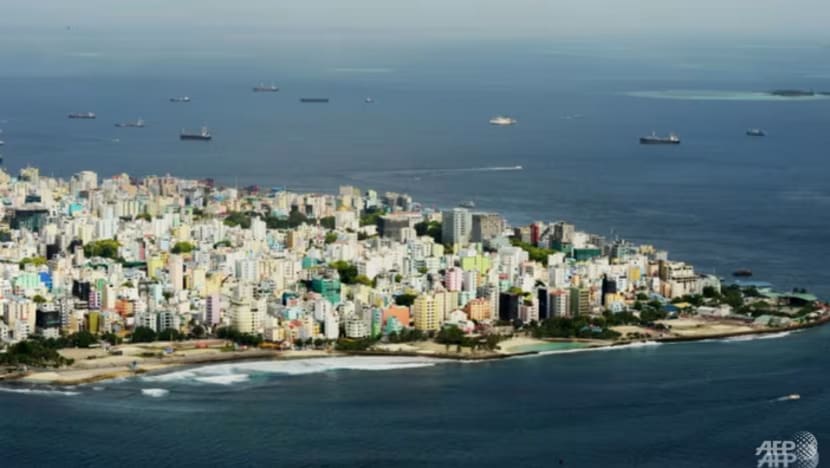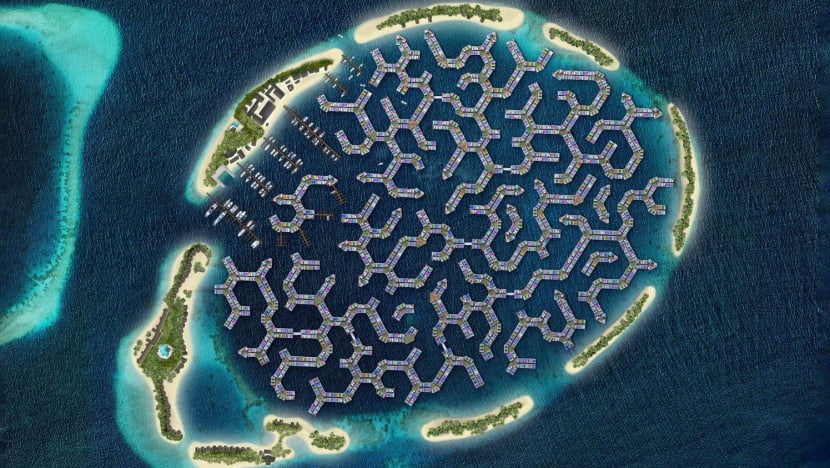Tired of failed climate promises by rich nations, tiny Maldives takes matters into its own hands
Initiatives include building desalination plants for freshwater, installing artificial reefs and a push to power the nation by solar energy.

The Maldives capital Male. (Photo: AFP/Roberto Schmidt)

This audio is generated by an AI tool.
SINGAPORE: Tired of unfulfilled climate promises by rich countries, the tiny island nation of Maldives is implementing its own environmental protection strategies to stay above water.
The nation spends about 30 per cent of domestic resources on adaptation and transition, its Minister of Environment, Climate Change and Technology Aminath Shauna said on Friday (Nov 10).
This includes building desalination plants for freshwater, installing artificial reefs and a push to power the nation with solar energy.
Ms Shauna was speaking to CNA on the sidelines of the Bloomberg New Economy Forum in Singapore. The event brings together top political and business leaders to tackle pressing global concerns such as inflation, geopolitical tensions, the ascent of artificial intelligence and the climate crisis.
AT RISK OF SINKING
Maldives, the smallest nation in Asia by land area, is under the looming threat of disappearing into the sea.
While its contribution to global emissions is a mere 0.003 per cent, the archipelago is among the most vulnerable countries to climate change and global warming.
Scientists say 80 per cent of the nation could be uninhabitable by 2050 due to rising sea levels. Most of Maldives' 1,200 islands are just about 1m above the sea level.
Ms Shauna said the country has seen increasing instances of extreme weather events, such as flooding, due to heavy rainfall patterns. Its islands are also experiencing an alarming rate of erosion.
“Global sea level rise and climate change is an existential threat for us,” she said.
“Our entire nation's protection and survival really depends on the health of our reefs. As temperature increases, it could mean the death of our coral reefs.”
Maldives has one of the most extensive coral reef ecosystems in the world. Coral reefs can protect coastlines from storm surges and erosion.
They also play a key role in Maldives’ economy by supporting its main industries of fishery and tourism.
NOT RELYING ON THE WORLD
Ms Shauna said the vulnerable island nation is not relying on the world to save it.
Maldives – along with other low-lying nations – have repeatedly tried to secure funds from big emitters to help deal with the impact of climate change.
“We have been talking about this since the first COP (Conference of the Parties) summit. We know that the world has not come together to help us effectively and in time for us to be able to adapt to the impacts of climate change,” she said.
The Organization for Economic Cooperation and Development (OECD) said last year that rich countries failed to keep a pledge promising US$100 billion per year to developing nations to help them achieve their climate goals.
Even when funding is approved, the process is tedious and the money could take years to materialise, said Ms Shauna, giving an example of two projects from Maldives under the Green Climate Fund (GCF).
“By the time the money does come to the Maldives, the entire reality has changed – we're talking about coastal erosion, about running out of fresh water,” she said.
“People can't wait for the money to come five years later to address the issue of erosion.”
This has forced the nation to take matters into its own hands and inject funds from its domestic revenue and budget to invest in green transition and adaptation.
MALDIVES’ GREEN INITIATIVES
The nation is using engineering solutions to put in place coastal protection projects, such as preserving and regenerating coral reefs.
“So far, we have protected about 13 per cent of our reef area. We are using nature-based solutions on how we could possibly use it as a defence mechanism against tidal swells and coastal erosion,” said Ms Shauna.
“We are also looking at utilising new technology to collect data and better design our coastal protection and adaptation measures. So like I said, we're not waiting for the world to come to us. We are already doing this (ourselves).”
With none of its islands able to meet the freshwater needs of its population of around 530,000 people, Maldives has built desalination plants across the archipelago.
Through land reclamation projects, the nation has increased the size of some of its islands where the land is higher.
However, Ms Shauna acknowledged that land reclamation is a “double-edged sword” that also harms the environment and impacts marine resources.
Maldives is also constructing a floating city that can house 20,000 people using modular units attached to an underwater concrete hull that is screwed to the seabed.

FUELLED BY SUNSHINE
The country is heavily investing in a source of renewable energy that it has in abundance – solar.
It is working to install more than 50 megawatts of solar capacity and 40 megawatt hours (MWH) of battery storage, according to the World Bank.
“Sunshine is in abundance in the Maldives and utilising that solar power to fuel our economy is one of our key priorities,” said Ms Shauna.
Aside from cleaner energy, a nation powered by renewables will also save the 10 per cent of gross domestic product (GDP) that the country spends each year on imported fossil fuel, she said.
She added that the freed-up funds can be channelled into education, healthcare and other developmental needs.
“As a country that is so heavily dependent on imported fossil fuel and transforming our economy to one fuelled by sunshine ... it’s a win-win in all areas.”
She said the nation currently has a 13 per cent peak demand from renewables and expects to double that amount to 26 per cent in the next few years.
Maldives has an ambitious net-zero target by 2030.
















